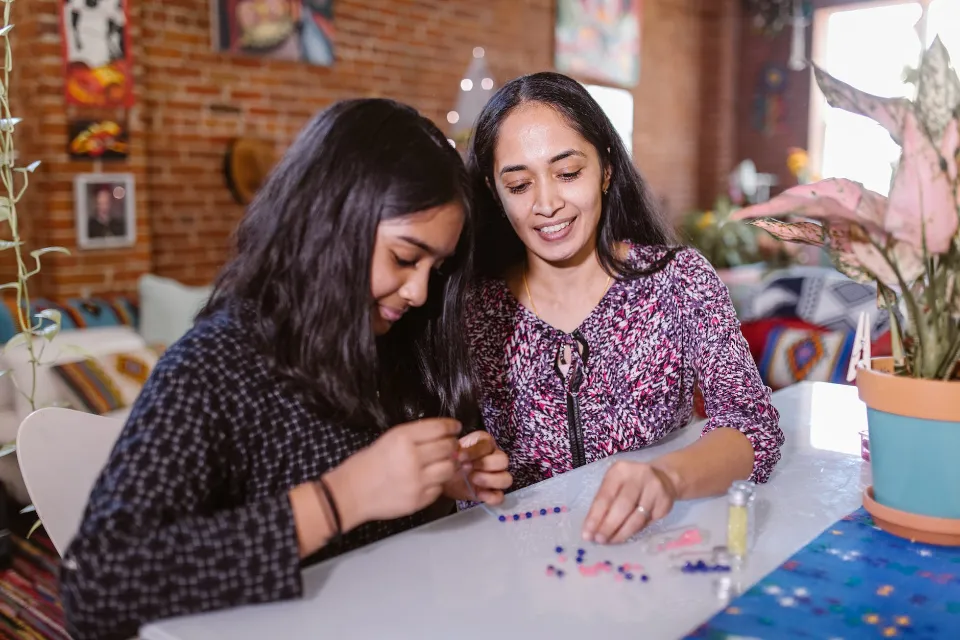Even though the majority of kids go to public or private schools, more and more are being homeschooled. Find out more about the How does Homeschooling Work and the actual issues raised when parents educate their children at home.
Homeschooling can be carried out in a variety of ways, including through online courses, textbooks, and even co-op classes, but in the end, a child’s education is the responsibility of their parents or guardians. Every state in the United States. recognizes homeschooling as a legal form of education, and parents can decide at any time to begin homeschooling.
Please read on.
Table of Contents
How Does Homeschooling Work?
If you have never done anything with “homeschooling,” this is an extremely interesting question! Home education can appear to be very mysterious. Without a qualified instructor presenting the material in front of you, how can you possibly learn anything? In the United States, the majority of people are very familiar with that situation. that it seems impossible for there to be any other way.
The funny thing about education is that it comes in all different forms. You engage in a form of homeschooling when you become curious about something and visit a location like How Stuff Works to learn more about it. This is sometimes called interest-motivated education or self-motivated education. Whatever the cause, when you become interested in something, it inspires you to learn more about it, which you do by conducting your own research.
Homeschooling is different for every family:
- On one end of the spectrum, there are families who support a child’s interest in a subject by encouraging them to learn more about it. The idea is that there are opportunities to investigate math, science, history, geography, and other subjects in any area of interest. The child naturally explores a subject, and those ideas are woven into that exploration. Over time, all of the topics covered in “normal” schooling get covered, but they happen in a much different order and at the child’s own pace.
- Families who purchase every book and adhere to the state curriculum, much like a traditional school, are at the other end of the spectrum. Simply, the material is taught in a more intimate setting at home.
Any family can fall anywhere along that spectrum when choosing to homeschool their children.
In a setting of homeschooling, do people actually learn anything? My observations indicate that homeschoolers excel, at least up to the college level. Obviously, it depends on the individual student and family, but one of the best things about being a human is that we are all constantly learning. Children pick up languages naturally because their amazing brains are designed to do so; no special effort is required on their part. Numerous other things are also things that the brain wants to learn!

Types of Homeschool Programs
Traditional Programs
In a traditional program, families typically maintain a structure that is replicated in a school environment, which entails purchasing schedules, textbooks, tests, and lesson plans. Once the lessons have been taught, quizzes, tests, and writing assignments have been given, traditional homeschooling parents spend some time with each child on each subject. Many families enjoy the flexibility of fitting their children’s schedules around daily life, even though traditional homeschooling necessitates a lot of hands-on teaching and supervising on your part as the parent. You can buy curriculum for your child’s needs and your teaching style if you choose to homeschool them the traditional way. But it also means that you will be solely responsible for keeping track of your children’s progress, grading them, keeping track of their credits, and ensuring that they understand the material they need to succeed. Consider sharing the record-keeping and grading tasks with a recognized homeschool academy for their professional guidance and advice if you find it challenging to stay on top of everything.
Online Homeschool Programs
Online programs can seem very intimidating when considering homeschooling. Many families value the development of their child’s 21st century skills through online education because it requires less of you as a teacher. Students can watch pre-recorded videos in many online homeschooling programs repeatedly until they understand the material. Additionally, since the tests and quizzes are graded right away, you can always see how well your child is doing. Just be aware that not all online programs are as accommodating, as they may require your child to schedule live classes or specific login times into their academic day. An Academic Advisor will be available to assist you with what is necessary and to answer any questions you may have in good online homeschooling programs, which will also have note-taking guides to keep you and your children on track. Additionally, to guarantee that your students receive credit for everything they do during high school, the best online programs will be offered by accredited institutions.
Blended Learning Programs
In its simplest form, the phrase “blended learning” refers to a mix of traditional and online education. This choice gives students even more customization because it provides more course variety to best suit their learning preferences and skills. To put it simply, blended learning offers the best of both worlds! Additionally, it gives you, the parent, more latitude to teach the subjects you love and are good at while selecting an online specialist to teach the subjects you are not confident teaching. Unsure of the best ways to teach biology and conduct labs? worried about how to teach algebra or geometry properly? To ensure that your child receives the best education possible, there are numerous interactive online options with experts who can teach, assign homework, and even help grade. According to your child’s preferred learning style, the best blended learning programs will select curriculum and lessons. So, if you’re unsure of how your child learns best, you or your child should take this learning style assessment prior to selecting a blended learning program.
Unschooling
Many parents who ask the question “how does homeschooling work?” are drawn to the idea of flexibility and unique learning experiences, but wonder how to make it all come together with a curriculum. Unschooling is a strategy where families let their kids learn through their personal interests and create life experiences around those interests. Many parents want their children to enjoy learning, and they think that the more personalized the education, the more likely it is that their children will retain the information and want to continue learning in the future. The emphasis shifts to promoting exploration and learning through unconventional means, such as travel, housework, elective classes, jobs/internships, extracurricular activities, and play, in which the student takes the initiative to learn new things. The core of unschooling is letting the child learn based on their interests rather than preconceived notions of what needs to be learned at each age.

How Do I Get Started Homeschooling?
In all 50 states, homeschooling is acceptable. In fact, you could start homeschooling right now. Simply consult the laws in your state. Homeschooling is a simple process, and more than two million people have already done it to prepare the way for you. As with any significant undertaking, you will need to take your time to ensure that you start off on the right foot. We have been supporting the homeschooling community for more than 20 years, and we will continue to do so as you move forward. There are a few tried-and-true steps to starting homeschooling that will help you get started. Whether you intend to homeschool for the long term or only briefly, you should adhere to these guidelines.
To begin homeschooling, selecting the appropriate curriculum is crucial.
For your first steps in beginning to homeschool, visit our How to Start Homeschooling page!
- Research your state homeschooling lawsand fulfill their requirements
- Recognize the motivations and learning preferences of your students. Take this quiz on homeschooling and this one on learning styles to get started.
- The learning styles of your students and your homeschooling goals should be supported by the curriculum you choose. To limit your options, take this quick quiz on the curriculum. This quiz will assist in identifying curriculum that complements both your homeschooling style and your child’s learning preferences. According to the quiz results, you can easily find the best curricula in our resource guide. In addition, use an easy-to-start homeschool curriculum if your goal is temporary homeschooling. For families that are just getting started, Time4Learning provides a free Welcome to Homeschool guide.
- Organize your homeschooling environment, curriculum, daily homeschooling plan, and schedule. For examples of daily schedules for various types of homeschooling, click here.
- Inhale deeply, then begin!
- If you require assistance, get in touch with us!
What Are the Benefits of Homeschooling?
There are many different ways to homeschool; in fact, each family’s version of homeschooling is unique. To decide how they want their child to learn and what homeschooling might entail, parents typically take some time. Does your child take pleasure in reading and completing worksheets? The best option for your family may then be to use a homeschooling curriculum that adopts that stance. Using an online curriculum for homeschooling your child may be a great fit if they enjoy technology.
Since every family’s experience with homeschooling is different, the advantages also vary from person to person. The majority of homeschooling families do reap some advantages, though. For instance, homeschooling gives parents the freedom to customize the curriculum to meet the needs of their particular child. As a result, your homeschooled child may be ahead in reading but behind in math, and with homeschooling, the parents can offer sufficient instruction for every level without being constrained by a grade level.
Another illustration is the freedom that comes with homeschooling, which enables the use of vacation days, medical leave, and other things. It is your life that works with school; school does not continue without the student. Families with multiple children and health issues, single parents, working parents, or families with multiple children can all greatly benefit from this reality. Perhaps the most well-known advantage of homeschooling is that it meets your kids where they are. With no fear of failure, homeschooling highlights each student’s unique talents and tenderly supports their weaknesses.
- Assess your child’s individual needs
- Take control of your child’s education to provide the help they need
- Homeschooling offers one-on-one instruction
- Provide a truly personalized education plan
- Learning is self-paced
- Reduce the fear of failure
- Eliminate classroom teasing
- Establish a distraction-free learning space.
- By addressing weak areas and highlighting your academic strengths, you can increase your confidence.
- Homeschooling’s adaptability enables students to learn whenever, wherever, and however they see fit.
- If parents are on a tight budget, they may even be able to homeschool their children for free.
What Homeschool Supplies Do I Need?
Whether or not they homeschool their children, most parents find the start of the school year to be exciting. Everyone enjoys the prospect of a brand-new year that is cleanly organized and unspoiled. Additionally, homeschool families should take advantage of the sales on school supplies to stock up! It’s a good idea to pack your basket with supplies whether you have a big family or just one kid. You will eventually use these boxes of pencils and blank notebooks, so it only makes sense to take advantage of the sales while you can!
But at first, you might be unsure of the equipment you’ll need for homeschooling. After all, in traditional schools, teachers give out a supply list based on the number of students in the class in anticipation of large group projects and prolonged, multi-student use. Even though it seems strange to use one of these lists for homeschooling a single child, it’s actually a fantastic template shopping list for new homeschoolers. Extra materials are always useful to have on hand in case inspiration strikes!
Some homeschooling families have a “school-at-home” approach where their homeschool looks very similar to traditional education, while others may have a more natural approach to homeschooling and use exploration and discovery to ignite their curiosity for learning. However, if you only intend to homeschool for a short time, you might want to think about using the homeschooling strategies that are clearest and most practical. For instance, you can sign up for many online homeschooling curricula on a monthly basis and begin using them within a few days.
In any case, it’s a good idea to stock up on a few basic supplies for your homeschool. See where you end up by starting with this list!
Paper Supplies
- Notebooks and/or notebook paper
- Printer paper and toner/ink
- Graph paper
- Index cards
Writing Supplies
- Pencils
- Pencil sharpeners
- Erasers
- Highlighters
- Pens
- White-Out
Math Supplies
- Graphing calculator
- Rulers
- Calculators
- Protractor
Craft Supplies
- Scissors
- Elmer’s glue
- Glue sticks
- Glitter glue
- Hot glue gun
- Construction paper
- Colored pencils and/or crayons
- Markers
- Watercolor paints + paintbrushes
- Chalk
- 1-hole punch and 3-hole punch
Organization Supplies
- Pencil cases
- 3-ring binders
- Pocket folders
- Whiteboard
- Dry erase markers
- Corkboard + pushpins
- Calendar
- Planner
- Stapler + staples
- Rubber bands
- Pencil clips
- Safety pins
- Binder clips
- Page protectors

Tips for Making a Homeschooling Schedule
Homeschoolers structure their days however it suits them. Many begin their schooling early in the morning, as in a traditional school, but some opt to make less distinction between “school” and “home.” If a child gets excited about a science experiment before bed, some parents follow the child’s enthusiasm to see where it leads; this becomes part of the school day as well.
A homeschooling family’s daily schedule will be greatly influenced by the educational philosophy they select. Most of us are familiar with only one style of education—the traditional system of textbooks, desks in rows, and standardized testing—but a wide array of educational philosophies exists. These approaches include Waldorf, Montessori, Charlotte Mason, classical, leadership education, interest-led learning, unit study, and others. The freedom to combine ideas that best serve their children’s needs is a benefit of homeschooling.
You might also be curious as to whether homeschoolers use the same academic year as public school students. In actuality, homeschoolers have total control over how their academic year is organized. Many students adhere to the conventional school calendar, while others attend classes all year long or take vacation days during particular weeks.
Planning a Curriculum for Homeschooling
A wide range of curricula and resources are now readily available as a result of the quick growth in the number of homeschoolers. Catalogs are brimming with choices based on various educational philosophies, learning techniques, how much time a homeschool teacher should spend on daily instruction, and so forth.
Subjects typically taught include the standard disciplines followed in a traditional school program as well as those that capitalize on the child’s interests. In his best-selling book The Element, Ken Robinson writes that “the key to [educational] transformation is not to standardize education, but to personalize it, to build achievement on discovering the individual talents of each child, to put students in an environment where they want to learn and where they can naturally discover their true passions.” When parents teach their children at home, they have access to a natural setting where they can use a method of instruction that is tailored to each child’s individual interests, skills, and learning preferences.
Homeschooling families frequently combine certain subjects like history, literature, and the arts that aren’t necessarily age- or grade-specific. Children of different ages might study the same historical period together, for instance, and then be given assignments that correspond to their respective levels of development. In order to meet each student’s specific needs, a homeschooling parent may provide one-on-one tutoring for each child in other subjects like math and reading. The other students may be engaged in independent work or play in another room, depending on the age of each child.
FAQs
Are Homeschooled Kids More Behind Or Ahead Than Public School Kids?
One of the advantages of homeschooling is that students can progress according to their own temperament and timetable. Homeschoolers scored on standardized tests on average in the 87th percentile, according to a National Home Education Research Institute study, while students in public schools scored on these tests on average in the 50th percentile. However, it’s possible that they are several grades behind in some subjects while being ahead in others.
Does the State Fund Any Homeschool Programs?
Government-funded programs vary widely from state to state, but the majority of homeschooling families fund their children’s studies themselves. In some places, joining a state-based program is optional. If that is the case, the state will fund particular materials in return for the homeschool continuing to adhere to the program’s rules.
Is There a Network of Parents Who Homeschool?
Most states and regions offer a variety of resources and social networks to homeschoolers. In addition to forming co-ops, in which families group together to have classes, there are social events such as lectures, field trips, art classes, music instruction, sports, and playdates.
How Long Does Homeschooling Last?
Homeschooling is an option for students up until they graduate and enroll in college. Families can decide to homeschool all the way through their children’s education, or they can do it for a short period of time before sending their children back to a traditional school. The popularity of homeschooling is starting to catch the attention of most colleges. Even elite universities like the Ivy League have hired and admitted graduates who attended homeschooling.



